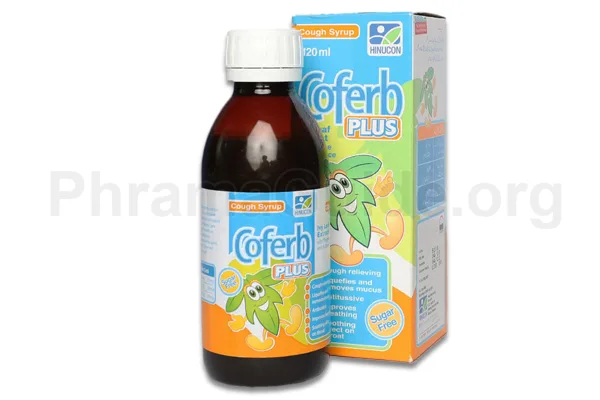Coferb syrup is a natural remedy that is used to treat coughs, bronchitis, and other respiratory conditions. It is a leaf extract of the ivy plant, that provides expectorant and anti-inflammatory effects and relieves cough and congestion. The following are some common and off-label uses of Coferb Syrup:
Common Uses of Coferb Syrup
- Cough Relief: Coferb syrup has expectorant properties, which means it helps to thin and loosen mucus in the airways. It is often used to relieve coughs associated with respiratory conditions such as bronchitis, common cold, and coughs with excessive mucus production.
- Bronchial Congestion: Coferb syrup can help alleviate bronchial congestion by promoting the clearance of mucus from the respiratory tract. This can provide relief for individuals experiencing difficulty breathing due to mucus buildup.
- Asthma Support: The use of Coferb syrup provides bronchodilatory effects, which means it may help to widen the airways and improve breathing in individuals with asthma. However, it is important to note that Coferb syrup is not a replacement for prescribed asthma medications, and anyone with asthma should consult their healthcare provider before using it.
- Respiratory Infections: Coferb syrup is sometimes used to support the treatment of respiratory infections, such as bronchitis and pneumonia. Its expectorant and mucolytic properties may help to reduce mucus production and facilitate the removal of secretions from the lungs.
Off-label Uses of Coferb Syrup
In addition to its traditional uses for coughs, bronchitis, and other respiratory conditions, Coferb syrup has also been used off-label for a variety of other conditions, including:
- Sinusitis: Coferb syrup can help to thin and loosen mucus in the sinuses, making it easier to drain.
- Ear Infections: Coferb syrup can help to reduce inflammation in the ear canal and eardrum, which can help to relieve pain and pressure associated with ear infections.
- Skin Conditions: Coferb syrup can help to reduce inflammation of the skin, making it a useful remedy for conditions such as eczema, psoriasis, and dermatitis.

What is Coferb?
Coferb Syrup is one of the leading brands of Ivy Leaf Extract, manufactured and marketed by Hilton Pharmaceuticals (Pvt) Ltd, Pakistan.
Coferb Alternatives : Ivy Leaf Extract Other Brands
Below are some available similar brands that can be used as an alternative to Coferb Syrup:
- Samvy : Sami Pharmaceuticals (Pvt) Ltd, Pakistan.
- Prospan : Highnoon Laboratories Ltd, Pakistan.
- Linkus : Herbion Pakistan (Pvt) Ltd.
- Cufex : Neutrifactor Pakistan (Pvt) Ltd.
- Cibcos-Ivy : Cibex (Pvt) Ltd, Pakistan.
- Hylixia : Searle Pakistan (Pvt) Ltd.
- Cofif : AGP Pharma (Pvt) Ltd, Pakistan.
- Releaf : Nutris Laboratories, Pakistan.
- Ivy Cough : SJ Herbal Laboratories, Pakistan.
- Olcuf : Getz Pharmaceuticals (Pvt) Ltd, Pakistan.
Coferb : Available Formulations and Strengths
Presently, Coferb is available in Syrup form.
Coferb Syrup : Ivy Leaf Extract 35mg/5ml strength.
Who Should Not Use Coferb?
Coferb syrup is generally considered safe when used as directed. However, there are certain situations where its use may be contraindicated or should be approached with caution.
Allergy or hypersensitivity: Individuals who are allergic to ivy leaf (Hedera helix) or any components of the Coferb syrup should avoid its use. Allergic reactions can range from mild skin irritations to severe allergic reactions, including difficulty breathing and anaphylaxis.
Pregnancy and breast-feeding: The safety of Coferb syrup during pregnancy and breastfeeding has not been established. It is recommended to consult a healthcare professional before using Coferb syrup during these periods.
Children: Coferb syrup is typically not recommended for children under the age of 2 years, as their airways are smaller and more sensitive. Always consult a pediatrician or healthcare professional before giving Coferb syrup to children.
Chronic lung conditions: If you have a chronic lung condition such as asthma or chronic obstructive pulmonary disease (COPD), it is important to consult with a healthcare professional before using Coferb syrup. While it may have potential benefits for respiratory symptoms, individual circumstances, and treatment plans should be taken into consideration.
Medication interactions: Coferb syrup may interact with certain medications, including those used to treat asthma or other respiratory conditions. It is important to inform your healthcare provider about any medications or supplements you are currently taking to assess potential interactions.
Recommended Daily Dosage of Coferb Syrup
Coferb Syrup Dose for Adults and Children (above 12 years):
- 5 ml (1 teaspoon) to 10 ml (2 teaspoons) taken orally, three times a day.
Coferb Syrup Dose for Children (Under 12 Years):
- Children 2-5 years old: 2.5 ml three times daily.
- Children 6-11 years old: 5 ml three times daily.
How Coferb Works?
The mode of action of Coferb is not fully understood, and it is believed to involve multiple mechanisms. However, the component found in Coferb (Ivy Leaf Extract) is thought to contribute to its potential therapeutic effects.
Here are some proposed mechanisms of action:
- Mucolytic activity: Coferb is believed to have mucolytic properties, meaning it can help to break down and thin mucus. This action may assist in clearing the airways and reducing congestion.
- Expectorant activity: Coferb is thought to act as an expectorant, which helps to facilitate the removal of mucus from the respiratory tract. This can aid in coughing up and expelling excess mucus, relieving symptoms of respiratory conditions.
- Anti-inflammatory effects: Coferb contains certain compounds, such as saponins, which have been found to possess anti-inflammatory properties. These compounds may help reduce inflammation in the respiratory system, potentially contributing to symptom relief.
- Bronchodilatory effects: Some studies suggest that Coferb may exhibit bronchodilatory activity, meaning it may help to widen the airways and improve airflow. This effect could potentially benefit individuals with conditions such as asthma or bronchial spasms.

Leave A Comment